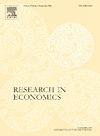Remittance and economic growth nexus in BRICS countries: Evidence from PSTR with endogeneity
IF 1.3
Q3 ECONOMICS
引用次数: 0
Abstract
This study evaluates threshold impact of remittances on economic growth based on data for a sample of BRICS countries for the period 1994–2018. In doing so, we employ Panel Smooth Transition Regression (PSTR), which captures both heterogeneity and nonlinearity of smooth transition in estimated coefficients from one extreme to another regime. Based on the PSTR model results, the threshold of remittance ranges between 4.82 and 30.65 % for remittance percentage of GDP (RPG) in BRICS countries. Similarly, threshold estimated value of remittance varies from 27.45 to 30.76 % for the remittances received to paid ratio (RRP). We obtained extreme lower and extreme higher regimes characterized by smooth and sharp transitions in growth-remittances nexus conditional upon control variables for RPG under CG and L-BFGS-B algorithms, respectively. The findings suggest that remittance has a positive impact on economic growth under lower regime and negative impact under higher regime. As per the regression results, remittance has positive impact on economic growth below the estimated threshold whereas above the threshold remittance has negative consequences on economic growth. In addition, investment from abroad becomes growth neutral beyond the threshold. However, below the threshold foreign direct investment improves economic growth. In contrast, gross fixed capital formation substantially accelerates economic growth irrespective of extreme regimes underestimated threshold. Nevertheless, findings of trade balance impact on economic growth is estimated to be negative when it crosses the threshold of remittance. This study offers conspicuous policy suggestions based on the non-linear nexus of remittance and economic growth for BRICS countries.
金砖国家汇款与经济增长关系:来自PSTR的内生性证据
本研究基于1994-2018年金砖国家样本数据,评估了汇款对经济增长的阈值影响。在此过程中,我们采用面板平滑过渡回归(PSTR),它捕获了从一个极端到另一个政权的估计系数的平滑过渡的异质性和非线性。根据PSTR模型结果,金砖国家汇款占GDP比重的阈值在4.82%至30.65%之间。同样,汇款与汇款比率(RRP)的汇款阈值估计值从27.45%到30.76%不等。我们分别在CG和L-BFGS-B算法下得到了以RPG控制变量为条件的增长-汇款关系平滑和急剧过渡为特征的极低和极高状态。研究结果表明,低制度下汇款对经济增长有积极影响,高制度下汇款对经济增长有消极影响。从回归结果来看,在估计阈值以下,汇款对经济增长有积极影响,而在估计阈值以上,汇款对经济增长有消极影响。此外,来自国外的投资在超过阈值后成为增长中性。然而,低于门槛的外国直接投资促进了经济增长。相比之下,固定资本形成总额大大加速了经济增长,无论极端政权低估了阈值。然而,当贸易差额超过汇款门槛时,对经济增长的影响结果估计是负面的。基于汇款与经济增长的非线性关系,本研究为金砖国家提供了显著的政策建议。
本文章由计算机程序翻译,如有差异,请以英文原文为准。
求助全文
约1分钟内获得全文
求助全文
来源期刊

Research in Economics
ECONOMICS-
CiteScore
1.40
自引率
0.00%
发文量
37
审稿时长
89 days
期刊介绍:
Established in 1947, Research in Economics is one of the oldest general-interest economics journals in the world and the main one among those based in Italy. The purpose of the journal is to select original theoretical and empirical articles that will have high impact on the debate in the social sciences; since 1947, it has published important research contributions on a wide range of topics. A summary of our editorial policy is this: the editors make a preliminary assessment of whether the results of a paper, if correct, are worth publishing. If so one of the associate editors reviews the paper: from the reviewer we expect to learn if the paper is understandable and coherent and - within reasonable bounds - the results are correct. We believe that long lags in publication and multiple demands for revision simply slow scientific progress. Our goal is to provide you a definitive answer within one month of submission. We give the editors one week to judge the overall contribution and if acceptable send your paper to an associate editor. We expect the associate editor to provide a more detailed evaluation within three weeks so that the editors can make a final decision before the month expires. In the (rare) case of a revision we allow four months and in the case of conditional acceptance we allow two months to submit the final version. In both cases we expect a cover letter explaining how you met the requirements. For conditional acceptance the editors will verify that the requirements were met. In the case of revision the original associate editor will do so. If the revision cannot be at least conditionally accepted it is rejected: there is no second revision.
 求助内容:
求助内容: 应助结果提醒方式:
应助结果提醒方式:


